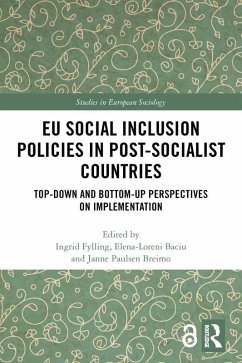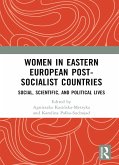EU Social Inclusion Policies in Post-Socialist Countries (eBook, PDF)
Top-Down and Bottom-Up Perspectives on Implementation
Redaktion: Fylling, Ingrid; Breimo, Janne; Baciu, Elena
45,95 €
45,95 €
inkl. MwSt.
Sofort per Download lieferbar

23 °P sammeln
45,95 €
Als Download kaufen

45,95 €
inkl. MwSt.
Sofort per Download lieferbar

23 °P sammeln
Jetzt verschenken
Alle Infos zum eBook verschenken
45,95 €
inkl. MwSt.
Sofort per Download lieferbar
Alle Infos zum eBook verschenken

23 °P sammeln
EU Social Inclusion Policies in Post-Socialist Countries (eBook, PDF)
Top-Down and Bottom-Up Perspectives on Implementation
Redaktion: Fylling, Ingrid; Breimo, Janne; Baciu, Elena
- Format: PDF
- Merkliste
- Auf die Merkliste
- Bewerten Bewerten
- Teilen
- Produkt teilen
- Produkterinnerung
- Produkterinnerung

Bitte loggen Sie sich zunächst in Ihr Kundenkonto ein oder registrieren Sie sich bei
bücher.de, um das eBook-Abo tolino select nutzen zu können.
Hier können Sie sich einloggen
Hier können Sie sich einloggen
Sie sind bereits eingeloggt. Klicken Sie auf 2. tolino select Abo, um fortzufahren.

Bitte loggen Sie sich zunächst in Ihr Kundenkonto ein oder registrieren Sie sich bei bücher.de, um das eBook-Abo tolino select nutzen zu können.
This book explores experiences with inclusion policy implementation in seven different post-socialist EU countries. It focuses particularly on two groups of people in constant danger of social exclusion: People with Roma background and people with disabilities.
- Geräte: PC
- mit Kopierschutz
- eBook Hilfe
Andere Kunden interessierten sich auch für
![EU Social Inclusion Policies in Post-Socialist Countries (eBook, ePUB) EU Social Inclusion Policies in Post-Socialist Countries (eBook, ePUB)]() EU Social Inclusion Policies in Post-Socialist Countries (eBook, ePUB)45,95 €
EU Social Inclusion Policies in Post-Socialist Countries (eBook, ePUB)45,95 €![Women in Eastern European Post-Socialist Countries (eBook, PDF) Women in Eastern European Post-Socialist Countries (eBook, PDF)]() Women in Eastern European Post-Socialist Countries (eBook, PDF)42,95 €
Women in Eastern European Post-Socialist Countries (eBook, PDF)42,95 €![Macro Policies For Appropriate Technology In Developing Countries (eBook, PDF) Macro Policies For Appropriate Technology In Developing Countries (eBook, PDF)]() Frances StewartMacro Policies For Appropriate Technology In Developing Countries (eBook, PDF)42,95 €
Frances StewartMacro Policies For Appropriate Technology In Developing Countries (eBook, PDF)42,95 €![European Narratives and Euroscepticism in the Western Balkans and the EU (eBook, PDF) European Narratives and Euroscepticism in the Western Balkans and the EU (eBook, PDF)]() Manuela CaianiEuropean Narratives and Euroscepticism in the Western Balkans and the EU (eBook, PDF)42,95 €
Manuela CaianiEuropean Narratives and Euroscepticism in the Western Balkans and the EU (eBook, PDF)42,95 €![European Citizenship and Social Integration in the European Union (eBook, PDF) European Citizenship and Social Integration in the European Union (eBook, PDF)]() Jürgen GerhardsEuropean Citizenship and Social Integration in the European Union (eBook, PDF)51,95 €
Jürgen GerhardsEuropean Citizenship and Social Integration in the European Union (eBook, PDF)51,95 €![Post-socialist Cities and the Urban Common Good (eBook, PDF) Post-socialist Cities and the Urban Common Good (eBook, PDF)]() Maja GrabkowskaPost-socialist Cities and the Urban Common Good (eBook, PDF)42,95 €
Maja GrabkowskaPost-socialist Cities and the Urban Common Good (eBook, PDF)42,95 €![Polish Return Migration after Brexit (eBook, PDF) Polish Return Migration after Brexit (eBook, PDF)]() Marek WodawskiPolish Return Migration after Brexit (eBook, PDF)21,95 €
Marek WodawskiPolish Return Migration after Brexit (eBook, PDF)21,95 €-
-
-
This book explores experiences with inclusion policy implementation in seven different post-socialist EU countries. It focuses particularly on two groups of people in constant danger of social exclusion: People with Roma background and people with disabilities.
Dieser Download kann aus rechtlichen Gründen nur mit Rechnungsadresse in A, B, BG, CY, CZ, D, DK, EW, E, FIN, F, GR, HR, H, IRL, I, LT, L, LR, M, NL, PL, P, R, S, SLO, SK ausgeliefert werden.
Produktdetails
- Produktdetails
- Verlag: Taylor & Francis eBooks
- Seitenzahl: 248
- Erscheinungstermin: 23. Juli 2019
- Englisch
- ISBN-13: 9780429785313
- Artikelnr.: 57493947
- Verlag: Taylor & Francis eBooks
- Seitenzahl: 248
- Erscheinungstermin: 23. Juli 2019
- Englisch
- ISBN-13: 9780429785313
- Artikelnr.: 57493947
- Herstellerkennzeichnung Die Herstellerinformationen sind derzeit nicht verfügbar.
Ingrid Fylling holds a position as associate professor in Sociology at Nord University, Norway. Her main research interest is in disability studies and studies of local welfare services. She is also a board member of the Nordic Network for Disability Research. Latest publication (co-authored): Fylling, I. and Melbøe, L. (2019). Culturalisation, homogenisation, assimilation? Intersectional perspectives on the life experiences for Sami people with disabilities. Accepted for publication in Scandinavian Journal of Disability Research 2019 http://doi.org/10.16993/sjdr.575.. Janne Paulsen Breimo is a professor in social work at the Faculty of Social Sciences, Nord University, Norway. Her research interests include social policy and social welfare. She is the chair of the European Sociological Association's Research Network on the Sociology of Social Policy and Social Welfare (RN26). Co-authored publications: Romanian Roma: An Institutional Ethnography of Labour Market Exclusion (2016), Networking enforced - comparing social services' collaborative rationalesacross different welfare regimes (2016); Planning individually? Spotting international welfare trends in the field of rehabilitation in Norway (2016). Elena-Loreni Baciu is an Associate Professor at the Social Work Department from the West University of Timisoara, Romania and a co-founder of the Research-Action Centre on Discrimination and Social Inclusion at the same University. (Co)-authored publications: Between equality and discrimination: disabled persons in Romania (2017); Exploring the social relations of Roma employability (2016); Romanian Roma: An institutional ethnography of labour market exclusion (2016).
1. Implementing Social Inclusion Policies in Post-socialist EU Countries:
Stumbling Blocks and Stepping Stones. 2. Independent Living in Central and
Eastern Europe? The Challenges of Post-socialist Deinstitutionalization. 3.
The Limits of Projects: Translating the Social Inclusion of Roma in Serbia.
4. Ethnicizing Poverty, Implementation of Structural Funds in Slovakia. 5.
Policies for Whom? Roma as Ethnic and/or National Minorities: The Case of
Hungary and the European Union. 6. How Can We Understand the Poor
Implementation of Disability Inclusion Policy in Romania?. 7. EU Social
Inclusion Policy Implementation in Poland 1989-2018. 8. Social Inclusion
and Political Participation of Persons with Disabilities in Slovakia. 9.
Social Economy Entities as a Practical Instrument to Enhance Social
Inclusion in Poland. 10. The Promotion of Social Inclusion in the Slovak
Education System through "Teach for Slovakia" Programme. 11. The Integrated
Approach in Practice: A Framework for Roma Work Inclusion. Case Studies
from Romania. 12. Inclusion Policies between EU Framework and
Post-socialist Heritage.
Stumbling Blocks and Stepping Stones. 2. Independent Living in Central and
Eastern Europe? The Challenges of Post-socialist Deinstitutionalization. 3.
The Limits of Projects: Translating the Social Inclusion of Roma in Serbia.
4. Ethnicizing Poverty, Implementation of Structural Funds in Slovakia. 5.
Policies for Whom? Roma as Ethnic and/or National Minorities: The Case of
Hungary and the European Union. 6. How Can We Understand the Poor
Implementation of Disability Inclusion Policy in Romania?. 7. EU Social
Inclusion Policy Implementation in Poland 1989-2018. 8. Social Inclusion
and Political Participation of Persons with Disabilities in Slovakia. 9.
Social Economy Entities as a Practical Instrument to Enhance Social
Inclusion in Poland. 10. The Promotion of Social Inclusion in the Slovak
Education System through "Teach for Slovakia" Programme. 11. The Integrated
Approach in Practice: A Framework for Roma Work Inclusion. Case Studies
from Romania. 12. Inclusion Policies between EU Framework and
Post-socialist Heritage.
1. Implementing Social Inclusion Policies in Post-socialist EU Countries:
Stumbling Blocks and Stepping Stones. 2. Independent Living in Central and
Eastern Europe? The Challenges of Post-socialist Deinstitutionalization. 3.
The Limits of Projects: Translating the Social Inclusion of Roma in Serbia.
4. Ethnicizing Poverty, Implementation of Structural Funds in Slovakia. 5.
Policies for Whom? Roma as Ethnic and/or National Minorities: The Case of
Hungary and the European Union. 6. How Can We Understand the Poor
Implementation of Disability Inclusion Policy in Romania?. 7. EU Social
Inclusion Policy Implementation in Poland 1989-2018. 8. Social Inclusion
and Political Participation of Persons with Disabilities in Slovakia. 9.
Social Economy Entities as a Practical Instrument to Enhance Social
Inclusion in Poland. 10. The Promotion of Social Inclusion in the Slovak
Education System through "Teach for Slovakia" Programme. 11. The Integrated
Approach in Practice: A Framework for Roma Work Inclusion. Case Studies
from Romania. 12. Inclusion Policies between EU Framework and
Post-socialist Heritage.
Stumbling Blocks and Stepping Stones. 2. Independent Living in Central and
Eastern Europe? The Challenges of Post-socialist Deinstitutionalization. 3.
The Limits of Projects: Translating the Social Inclusion of Roma in Serbia.
4. Ethnicizing Poverty, Implementation of Structural Funds in Slovakia. 5.
Policies for Whom? Roma as Ethnic and/or National Minorities: The Case of
Hungary and the European Union. 6. How Can We Understand the Poor
Implementation of Disability Inclusion Policy in Romania?. 7. EU Social
Inclusion Policy Implementation in Poland 1989-2018. 8. Social Inclusion
and Political Participation of Persons with Disabilities in Slovakia. 9.
Social Economy Entities as a Practical Instrument to Enhance Social
Inclusion in Poland. 10. The Promotion of Social Inclusion in the Slovak
Education System through "Teach for Slovakia" Programme. 11. The Integrated
Approach in Practice: A Framework for Roma Work Inclusion. Case Studies
from Romania. 12. Inclusion Policies between EU Framework and
Post-socialist Heritage.







